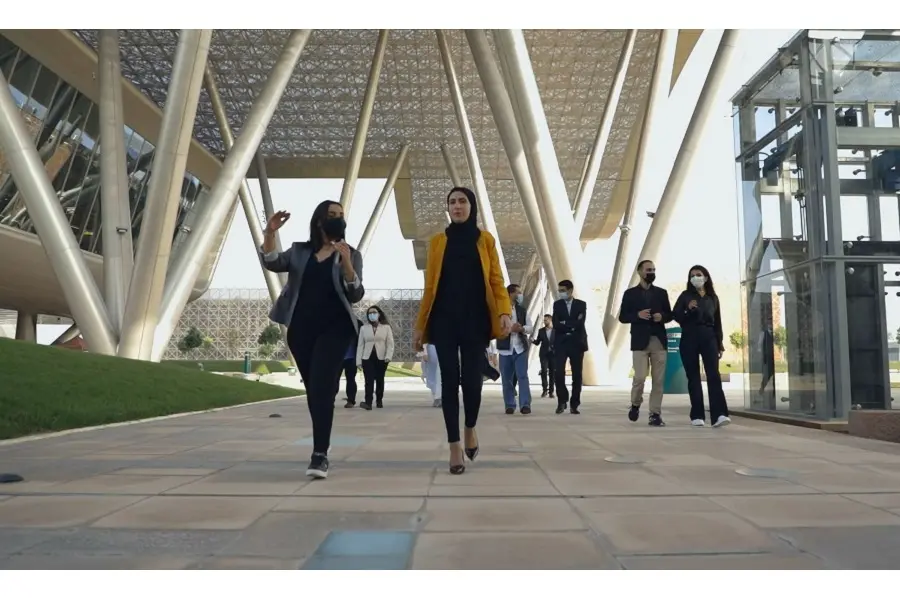PHOTO
Doha, Qatar: When hundreds of aspiring young Arab innovators converged in Doha this week to audition to be a part of the top seven on Qatar Foundation’s Stars of Science Season 14, Artificial Intelligence featured prominently throughout.
Stars of Science hosted the auditions at Qatar Science & Technology Park, a member of Qatar Foundation (QF), with a wide range of ideas spanning from healthcare and education to environmental sustainability and workplace safety. Terms such as machine learning, speech recognition, and expert systems were commonplace throughout this year’s auditions.
The heavy use of artificial intelligence (AI) mirrors a rapidly growing trend throughout the world – and especially the Arab world. According to a report published by Economist Impact and Google titled ‘Pushing Forward: The Future of Artificial Intelligence in the Middle East and North Africa’, the region is estimated to accrue $320 billion by 2030 from value added by AI.
“We are entering a golden age for AI research and development in the Arab world. Ambitious national strategies and staggering amounts of investment symbolize just how the region has embraced the potential of AI and the endless opportunities that come with it,” said Dr. Ahmed Elmagarmid, Executive Director of Qatar Computing Research Institute, part of Hamad Bin Khalifa University – also a member of QF – who returns to this year’s season of Stars of Science as an AI expert.
However, while the region has demonstrated a deep commitment to realizing a future with AI, the global discourse surrounding this field of study often excludes Arab perspectives, according to the Global AI Narratives Project, a collaboration between the Leverhulme Centre for the Future of Intelligence at the University of Cambridge.
“We in the Arab world are clearly underrepresented in the ongoing discussions surrounding AI, which has a tangible impact on those of us who masterfully engage with the technology and its various applications. Our concerns, needs, and ideas of what role AI can serve are often overshadowed, and so we must work even harder to overcome these biases,” added Dr. Elmagarmid.
QF’s Stars of Science tackles this issue and empowers Arab innovators aiming at introducing new AI-powered solutions. The show puts contestants in touch with experts from the country’s various AI-focused research entities, encouraging them to turn ideas into tangible products that envision locally relevant applications of this powerful technology.
Several of the show’s alumni have tailored AI to better suit the region’s culture and needs. Season 12 contestant Eiman Al Hamad, from Qatar, created the Arabic Conversation Fraud Detection program, filling in the Arabic-language gap among contemporary phone fraud prevention technologies. Her fellow contestant Ahmad Fathalla, from Egypt, designed the Educational Platform Using Electronic Cubes, which utilizes machine learning algorithms to analyze children’s learning patterns to better diagnose early development problems.
Another aspect that is helping Arab youth challenge these narratives is the promising state of talent development in the region. Local educational institutions focusing on AI are keeping pace with the rest of the world, with three Arab institutes – all established from as recently as 2009 onwards – ranking among the top 210 in the world in the fields of AI, computer vision, machine learning, and natural language processing, according to CSRankings.org.
Qatar is also adapting to this new landscape with the recently established University of Doha for Science and Technology (UDST), the country’s first university of applied sciences. This year, the university celebrated its first graduating cohort – including its first class of B.S. in data science and artificial intelligence graduates.
“The region is tapping into the incredible potential of AI. By setting up world-class institutions locally, we can ensure that we retain our brightest minds and bring an Arab perspective to the prevailing AI narrative. This will help develop new AI applications to solve problems relevant to our region, enabling our communities to develop exponentially,” said Dr. Rachid Benlamri, Vice President, Academic Affairs, UDST.
While AI continues to play a larger role in our lives, the global discourse surrounding it often excludes Arab perspectives, leading to technologies that do not adequately serve the region’s needs. Talent development initiatives throughout the region, such as Stars of Science, are helping young Arabs change the narrative to include their voices and that of their communities.
Stars of Science will air every Friday and Saturday from September 2, 2022, to October 14, 2022, on six channels in the region and online. Please visit the broadcast guide for channels and timings at starsofscience.com.
About Stars of Science:
As the premier innovation show in the Arab world, Stars of Science – the edutainment TV initiative of Qatar Foundation (QF) – empowers Arab innovators to develop technological solutions for their communities aiming to improve people’s well-being, provide financial opportunities to their local citizens, and advance sustainable development.
Over a 12-week process, the contestants demonstrate the effectiveness of their solutions in a shared innovation space, competing against time with the support of a team of experienced engineers and product developers.
An expert panel of jurors assess and eliminate innovators and their projects every week across several prototyping and testing rounds, until three finalists remain to compete for a share of the Grand Prize. Jury deliberation and online voting from the public determine the rankings of the two winners.




















